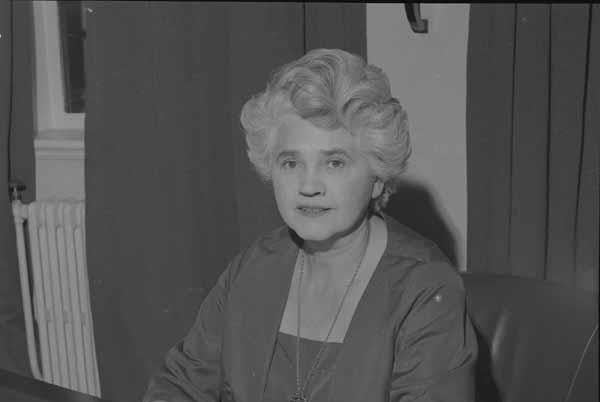
Baroness Jennie Lee was the first Minister for the Arts appointed under a Labour government in 1964
Photo: UK Parliamentary Archives
A riposte from the margins
In response to Nick Hytner’s recent dismissal of the concerns of a new generation of artists as ‘ill-informed’, Chrissie Tiller argues it is crucial to engage with their desire to envision new ways of being in the world.
60 years since Harold Wilson placed the arts at the centre of social reform by appointing a working-class woman, Jennie Lee, to be our first Minister for the Arts, we have a Labour government in power again.
Most of us, like theatre director Nick Hytner, are hungry for change. Some have even dared to hope, although our optimism of the heart has too often been confounded by the pessimism of political realities. Fifteen years of austerity, following the savage cuts imposed by Cameron’s 2010 coalition government, have caused irredeemable damage. The arts have almost completely disappeared from our state education system.
Increasing social and economic barriers, including the absence of safety nets and lack of access to the ‘right’ networks or opportunities have ensured there are 50% fewer working-class artists than there were in 1970s, when I set out.
Systemic inequality
First signs from this government, from raising NI contributions to attacks on disability and unemployment benefits, have not been encouraging. It will almost certainly be smaller, more vulnerable and precarious organisations, rather than those large institutions mentioned by Hytner that will bear the brunt of the harm.
Hytner contrasts current threats with a “golden time”, when the then newly-appointed Labour Minister for Culture, Media and Sport, Tessa Jowell, had “a lot of money to spend” and things, at the top at least, were “easy”.
There was certainly more money around in 2003, for innovative programmes in schools such as Creative Partnerships as well as support the cultural infrastructure of museums, galleries and theatres. But Jowell’s championing of art for art’s sake continued to place an emphasis on funding major cultural institutions in anticipation that the “poverty of aspiration” of ordinary folk might be tackled by offering them greater access to excellence as audiences.
Much like Hytner’s recent proposal to rescue a “teetering” sector by Arts Council England awarding all its funding to high quality ‘professional’ artists, while relegating community partnerships to a separate body, Jowell’s policies only further ensured the means of cultural production remained in the hands of a privileged elite. Systemic inequality continued to prevail.
How might we create a cultural democracy?
In 2010, when it became clearer that brutal cuts to arts funding were part of a much wider assault on welfare, education and public services that would impact disproportionally the excluded and marginalised, many artists began to recognise that it was only by coming together and working collaboratively with communities to address injustices that we might contribute to meaningful societal change.
Re-engaging with the work of Raymond Williams, we looked at how we might create a cultural democracy that would recognise the right of everyone to contribute to the making of meaning that the arts afford.
We re-found our touchstones in the emancipatory work of radical pedagogues such as Horton and Freire, in the writings of black feminist activists such as bell hooks, June Jordan and Audre Lorde – and contemporary thinkers such as Sarah Ahmed and Judith Butler – all of whom prompted us to find our role as cultural workers in wider struggles for equity and social transformation.
We are currently living, however, in a world where those struggles for equity, diversity and inclusion are moving backwards. Hatred for immigrants, rejection of women’s rights, denial of LGBTQI rights and dismissal of the threats imposed by climate change increasingly dominate the discourse. Totalitarianism, a move to right-wing politics and rule by oligarchies are rapidly becoming our lived reality.
New ways of being
This is why Hytner’s dismissal of the concerns of the activism of another generation of artists as little more than a signing up to “whatever the particular menu of fashionable progressive causes is at the moment”, whether it be “abolition of fossil fuels” or what he describes as a “particular way of looking at gender politics” disturbs me.
In recent conversations with younger artists, I have been humbled by discovering a generation who are thinking even more clearly about the interconnection between the struggles for social justice, climate justice and gender justice.
I have found a commitment to practices of care, and an understanding that it is only by taking a more holistic, anti-racist and intersectional approach that we might begin to counter the damage being inflicted by rampant capitalism and accelerating neoliberalism.
It is crucial that we welcome this growing desire of younger artists to engage creatively with allies and accomplices from other sectors, disciplines and generations who will work with us to envision new ways of being in this world.
Creating new spaces
In these dark times, it feels imperative that we create spaces where we can learn from one another and where those who have so far remained on the margins – by dint of their class, gender, race, disability, age or sexuality – have the possibility to share new stories, unfold other histories and challenge prevailing narratives.
It also feels incumbent, especially on those with power, to think about the words we choose. Language, as bell hooks reminds us, can be a place to “recover ourselves, to reconcile, to reunite, to renew” or a place to silence.
I hope that, rather than damning those young artists advocating a fairer and more just world as simply “ill-informed” or emptily following fashion, we can work instead to create spaces where we can come together in dialogue, open ourselves to possibilities and conceive of a world of greater equity and reciprocal understanding.
Join the Discussion
You must be logged in to post a comment.